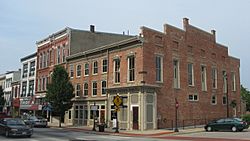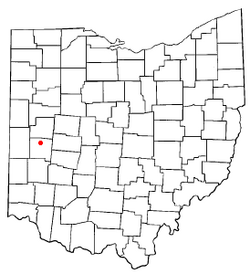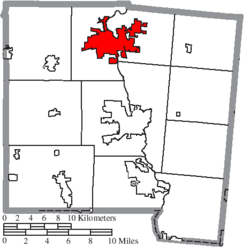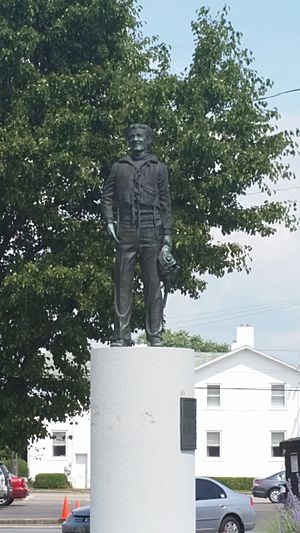Piqua, Ohio facts for kids
Quick facts for kids
Piqua, Ohio
|
|
|---|---|

Downtown Piqua
|
|
| Motto(s):
"Where Vision becomes reality"
|
|

Location of Piqua, Ohio
|
|

Location of Piqua in Miami County
|
|
| Country | United States |
| State | Ohio |
| County | Miami |
| Area | |
| • Total | 11.91 sq mi (30.85 km2) |
| • Land | 11.65 sq mi (30.17 km2) |
| • Water | 0.26 sq mi (0.68 km2) |
| Elevation | 873 ft (266 m) |
| Population
(2010)
|
|
| • Total | 20,522 |
| • Estimate
(2019)
|
21,332 |
| • Density | 1,831.23/sq mi (707.06/km2) |
| Time zone | UTC-5 (Eastern (EST)) |
| • Summer (DST) | UTC-4 (EDT) |
| ZIP code |
45356
|
| Area code(s) | 937, 326 |
| FIPS code | 39-62848 |
| GNIS feature ID | 1061544 |
| Website | http://www.piquaoh.org/ |
Piqua ( PIK-wə) is a city in Miami County, southwest Ohio, United States, 27 miles north of Dayton. The population was 20,522 at the 2010 census. It is part of the Dayton Metropolitan Statistical Area.
It was founded as the village of Washington in 1807 by a soldier under Gen. Anthony Wayne.
Contents
History
In 1747, Fort Pickawillany was constructed by the British to protect their trading post at a Miami village of the same name. It was located at the confluence of Loramie Creek and the Great Miami River. (The present city of Piqua developed about a mile to the southwest.) In 1752 Charles de Langlade, an Ottawa war chief of partial French Canadian descent, attacked the fort. He led more than 240 Ottawa and Ojibwe warriors allied with French forces against the British and the Miami village in the Battle of Pickawillany. The Miami chief and a British trader were killed in the conflict.
After the battle, the British and Miami abandoned this site. The Miami rebuilt Pickawillany, and Piqua later developed near their village. The British soon took over the area after defeating the French in the Seven Years' War (1754-1763), known in British North America as the French and Indian War.
Piqua was settled as two separate communities in 1780, known as Upper Piqua and Lower Piqua. The two villages united by 1800. Officially incorporated in 1807, Piqua developed along with construction of the Miami and Erie Canal.
The word 'Piqua' is believed to be derived from a Shawnee language phrase: Othath-He-Waugh-Pe-Qua, translated as "He has risen from the ashes," related to a legend of the people. It became associated with the Pekowi, one of the five divisions of the Shawnee people, who were eventually known as the Piqua.
This local Shawnee history was also the source of the name of the community of Shawnee, founded in 1797 on the east side of the Great Miami River. It is adjacent to the former Pennsylvania Railroad corridor, later used by the merged Penn Central Transportation and subsequently by Conrail. Shawnee has long since been incorporated into Piqua. The Piqua High School Indians athletic teams took their mascot name from the local Native American history.
Rossville (since incorporated into Piqua) was an early local African-American settlement. Virginia planter John Randolph of Roanoke, who served as a US Representative and Senator, arranged for the emancipation of his nearly 400 slaves in his will of 1833. He also provided money for his executor to relocate the freedmen to the free state of Ohio, and to buy land and supplies to help them establish a settlement. The will was challenged but in 1846, his 383 slaves gained their freedom. Most of these freedmen settled in Rumley, Ohio. Some eventually founded Rossville and an associated cemetery, known as the African Jackson Cemetery. These are located on the northeast side of the Great Miami River; they may be accessed by nearby North County Road 25-A.
'Atomic City'
Piqua was home to the first municipally operated nuclear power plant, the Piqua Nuclear Generating Station. It operated from 1962 to 1966, leading to Piqua being nicknamed "The Atomic City." This major demonstration project was a failure. The United States Atomic Energy Commission (now US Department of Energy) bought out the contract with the City of Piqua, in order to terminate the operations early. During this period a name brand automotive battery was manufactured and marketed locally as the "Piqua Atomic Power Plant."
Notable people
- Kenneth W. Benner - Brigadier general, USMC and veteran of World War II
- Brock Bolen - football player.
- Mills Brothers - jazz musicians, inducted into the Vocal Group Hall of Fame in 1998.
- John W. Daniels - co-founder and former CEO of Archer-Daniels-Midland (ADM) born and raised in Piqua and buried in Piqua
- Dominic Salvatore Gentile - World War II ace.
- Charles Blue Jacket - 19th-Century Shawnee chief in Kansas, and Methodist minister.
- Girard Edward Kalbfleisch - U.S. federal judge.
- Ollie Klee - baseball player.
- Terri Hemmert - Chicago disc jockey at WXRT-FM.
- James Kaiser - electrical engineer who developed the Kaiser window for digital signal processing, winner of the IEEE Jack S. Kilby Signal Processing Medal
- Kristin King - player on the bronze medal-winning Ladies' U.S. Hockey team at the 2006 Winter Olympics.
- Bill Lear - inventor and businessman, founder of Lear Jet and inventor of the 8-track cartridge.
- William McCulloch - lawyer, member of U.S. House of Representatives, and an author of the Civil Rights Act of 1964.
- John F. McKinney - U.S. Representative from Ohio.
- Rich McKinney - baseball player.
- John G. Mitchell - General in the Union Army.
- J. T. Patterson - geneticist.
- Quinn Pitcock - former starting defensive tackle for the Ohio State University football team and retired member of the Indianapolis Colts.
- William H. Pitsenbarger - Air Force pararescueman posthumously awarded the Medal of Honor.
- Louis Joseph Reicher - first Bishop of Austin, Texas (1948-1971).
- Harry Reser - banjo player and bandleader of the Clicquot Club Eskimos.
- Stephen Clegg Rowan - Vice Admiral, U.S. Navy.
- Brandon Saine - 2006 Ohio Mr. Football Award winner and running back for The Ohio State University football team
- Helen Schelle - founding partner of Fisher-Price, toy manufacturer.
- Lawrence Yates Sherman - U.S. Senator, 28th Lieutenant Governor of Illinois, and Speaker of Illinois House of Representatives.
- Tanya Thornton Shewell - member of the Maryland House of Delegates.
- Hiram Y. Smith - lawyer and U.S. Representative from Iowa.
- Mike Smith - baseball player.
- Jack Snow - writer and scholar.
- Muffin Spencer-Devlin - professional golfer.
- Joseph J. Spengler - economist, statistician, and historian of economic thought.
- Aileen Cole Stewart (1893-1997), prominent, pioneering African American United States Army Nurse Corps nurse during World War I.
- Joseph Widney - doctor, educator, historian, and religious leader.
- Robert M. Widney - founding father of the University of Southern California.
- James P. Wisecup - Vice Admiral, U.S. Navy.
- Patrick Zircher - illustrator of Marvel and DC comic books.
- Matt Finkes - New York Jets defensive end.
Geography
Piqua is located at 40°8′51″N 84°14′53″W / 40.14750°N 84.24806°W (40.147474, -84.247968).
According to the United States Census Bureau, the city has a total area of 11.89 square miles (30.79 km2), of which 11.62 square miles (30.10 km2) is land and 0.27 square miles (0.70 km2) is water.
The Great Miami River runs through Piqua. The area at the south end of town on the east side of the river is known as Shawnee.
Demographics
| Historical population | |||
|---|---|---|---|
| Census | Pop. | %± | |
| 1810 | 287 | — | |
| 1820 | 350 | 22.0% | |
| 1830 | 488 | 39.4% | |
| 1840 | 1,480 | 203.3% | |
| 1850 | 3,277 | 121.4% | |
| 1860 | 4,616 | 40.9% | |
| 1870 | 5,967 | 29.3% | |
| 1880 | 6,031 | 1.1% | |
| 1890 | 9,090 | 50.7% | |
| 1900 | 12,172 | 33.9% | |
| 1910 | 13,388 | 10.0% | |
| 1920 | 15,044 | 12.4% | |
| 1930 | 16,009 | 6.4% | |
| 1940 | 16,049 | 0.2% | |
| 1950 | 17,447 | 8.7% | |
| 1960 | 19,219 | 10.2% | |
| 1970 | 20,741 | 7.9% | |
| 1980 | 20,480 | −1.3% | |
| 1990 | 20,612 | 0.6% | |
| 2000 | 20,738 | 0.6% | |
| 2010 | 20,522 | −1.0% | |
| 2019 (est.) | 21,332 | 3.9% | |
| Sources: | |||
2010 census
As of the census of 2010, there were 20,522 people, 8,318 households, and 5,425 families residing in the city. The population density was 1,766.1 inhabitants per square mile (681.9/km2). There were 9,311 housing units at an average density of 801.3 per square mile (309.4/km2). The racial makeup of the city was 92.4% White, 3.3% African American, 0.2% Native American, 0.7% Asian, 0.4% from other races, and 2.9% from two or more races. Hispanic or Latino of any race were 1.4% of the population.
There were 8,318 households, of which 32.6% had children under the age of 18 living with them, 44.9% were married couples living together, 14.2% had a female householder with no husband present, 6.1% had a male householder with no wife present, and 34.8% were non-families. 28.7% of all households were made up of individuals, and 12.2% had someone living alone who was 65 years of age or older. The average household size was 2.44 and the average family size was 2.96.
The median age in the city was 38.1 years. 24.8% of residents were under the age of 18; 8.7% were between the ages of 18 and 24; 25.6% were from 25 to 44; 26.2% were from 45 to 64; and 14.7% were 65 years of age or older. The gender makeup of the city was 48.0% male and 52.0% female.
In popular culture
- Dav Pilkey's Captain Underpants children's book is set in Piqua. It was chosen because of its now discontinued annual "Underwear Festival" and history of manufacturing.
Economy
The city of Piqua is the home of Hartzell Propeller, a producer of small aircraft propellers. Evenflo (formerly Questor Juvenile Furniture) is the leading manufacturer of infant and toddler car seats, and has become one of Piqua's leading employers and industries.
In the late 1890s, Southwest Ohio was the heart of the US flaxseed growing area. There were some 13 linseed oil mills in Piqua, where the flaxseed was "crushed" to extract the vegetable oil, named linseed oil. The flax fiber was used to make both cloth and paper. The oil had a variety of industrial uses. Linoleum is a manufactured flooring product for which linseed oil is the binder. One of the vegetable oil mills in Piqua burned down in the 1890s, a common fate for wooden buildings soaked with vegetable oil. Its owner, American Linseed Oil Company, dispatched Alfred Willard French, their Chief Engineer, from Brooklyn, New York, to organize and supervise the rebuilding of the oil mill.
During the rebuilding of the mill, French included a machine he had invented and patented in 1898, a "cake trimmer", and purchased the most modern equipment then available. He met the leading citizens of Piqua. They were impressed with French, who had graduated from the Massachusetts Institute of Technology in three years, and had entrepreneurial spirit. They decided to invest in a new company he wanted to start. The French Oil Mill Machinery Company was founded 25 May 1900, with French as president, to make "improved oil mill machinery". By 1905 the company was exporting its patented and rugged vegetable oil mill extraction machinery all around the world. Today, the company has customers in over 80 countries, still serving the vegetable oil extraction market (to press such seeds as soybeans, cottonseed, rapeseed, canola, and many others). In addition, the company is a world leader in synthetic rubber dewatering and drying machinery, and in hydraulic molding presses for rubber, thermoplastic and composite materials.
During the late 19th century and much of the 20th century, Piqua was a major center of underwear production. A yearly Outdoor Underwear Festival was held downtown from 1988 until shortly after the demise and demolition of the factory owned by Medalist-Allen A, a direct descendant of the Atlas Underwear Company. Originally the festival had a serious historical focus. In later years it attracted adventurous types from surrounding towns, and Piqua residents discouraged their children from attending. Heritage Green Park now occupies the former Medalist factory site.
The Meteor Motor Car Company had a brief run as an independent record label and phonograph manufacturer in the 1920s. Acquired by Wayne Corporation of Richmond, Indiana, which manufactured school buses, it operated as the Miller-Meteor division. Miller-Meteor produced ambulances and hearses before closing down in 1979.
The Piqua Coca-Cola Bottling Company, owned by the Lange family, was located on the downtown square at the northeast corner of Main and High streets. It produced its signature product along with Sprite, Tab and Fresca in glass bottles for the Upper Miami Valley; metal canned products were shipped in from a plant in Speedway, Indiana. In the mid-1970s, the plant was bought by the Dayton Coca-Cola Bottling Company. The increased demand for Coke products in two-liter plastic bottles and cans made the aging local plant obsolete; it was closed down and razed by the end of the decade. A newer bottling plant was constructed in Huber Heights. A statue of pilot Don Gentile was erected at the site of the defunct plant.
The Val Decker Packing Company, which operated until 1981, was a local producer of hams, hot dogs, and other meats and lard under the tagline "Piquality." The large red steel cans, which contained the lard product, are now sought-after as collectors' items. The building which housed the meat packing plant was renovated in 1987 for office use by the Piqua Board of Education and several small businesses.
Piqua's industrial past produced a prosperity reflected in residential areas near downtown, which contain numerous large mansions and homes. Most notable is the Leo Flesh Mansion, built in the Chateauesque style. It looms over many of the surrounding buildings in the neighborhood. A "sister" house in Dayton, Ohio, was designed by the same architect.
Piqua's shopping mall, Miami Valley Centre Mall, opened in 1988 and was renovated in the mid-1990s. Its anchor stores include JC Penney, Elder Beerman, and Sears. Miami Valley Crossing (formerly Piqua East Mall, opened in 1970) was redesigned and updated in the late 1990s as a plaza with anchor stores, Big Lots, Wal-Mart, Jo-Ann Fabrics, El Sombrero Restaurant, and The Home Depot.
Top employers
According to Piqua's 2018 Comprehensive Annual Financial Report, the top employers in the city are:
| # | Employer | # of Employees |
|---|---|---|
| 1 | Evenflo | 606 |
| 2 | Industry Products Company | 411 |
| 3 | Nitto Denko Automotive Ohio | 354 |
| 4 | Walmart | 337 |
| 5 | Piqua City Schools | 320 |
| 6 | Hartzell Propeller | 313 |
| 7 | Piqua Steel Company | 304 |
| 8 | Crane Pumps & Systems Inc | 298 |
| 9 | United Parcel Services | 287 |
| 10 | City of Piqua | 231 |
Education
The Piqua City School District operates two elementary schools, one intermediate school, one middle school, a junior high school, and Piqua High School. Piqua is also home to the Upper Valley Career Center. Piqua is also home to several private schools, including Piqua Catholic School, the Piqua Seventh Day Adventist School, and the Nicholas School.
Piqua is home to Edison Community College.
Images for kids
-
Fort Piqua Hotel is one of four sites in Piqua listed on the National Register of Historic Places
See also
 In Spanish: Piqua (Ohio) para niños
In Spanish: Piqua (Ohio) para niños





